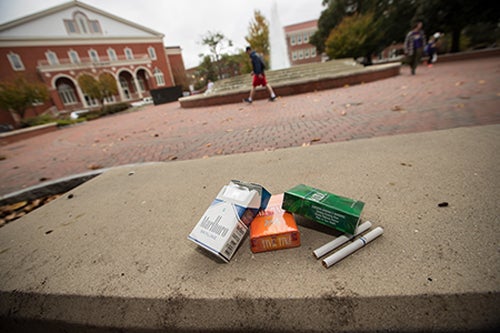BEGINS JULY 1
New campus tobacco policy approved
All forms of tobacco use will be prohibited within 100 feet of buildings on East Carolina University’s main campus and everywhere on its health sciences campus under a new tobacco usage policy that goes into effect July 1.
ECU’s current policy allows tobacco use beyond 25 feet of main campus buildings and within designated areas on the health sciences campus.
“I’m really proud of ECU for taking a bold step to support our community and our region in being healthier,” said Dr. Joseph Lee, an assistant professor in the College of Health and Human Performance, who spearheaded the policy change on behalf of the University Wellness Committee. “Everyone has a responsibility to try and make healthy choices, and we as a community have a responsibility to help our community quit using tobacco.”

Effective July 1, all forms of tobacco use will be prohibited within 100 feet of buildings on main campus and everywhere on the health sciences campus. (Photos by Cliff Hollis)
The health sciences campus joins more than 1,100 tobacco-free campuses nationwide – 47 of those in North Carolina.
The new policy pertains to “the use of any product containing, made or derived from tobacco that is intended for human consumption.” This includes cigarettes, chewing tobacco and vaping liquids.
The new prohibition of tobacco use on the health science campus includes vehicles parked on campus grounds, leased buildings and any offsite facilities occupied by ECU health sciences constituents.
“This resolution has my full support as we continue to model healthy lifestyles for the region,” said Dr. Phyllis Horns, vice chancellor for ECU’s health sciences division. “A decision to smoke affects not only the smoker, but also coworkers, students, patients and campus visitors. There is no safe level of exposure to secondhand smoke.”
The policy change was overwhelmingly backed by students and faculty, with numerous on-campus organizations pledging their support.
“This tobacco policy change is monumental. I’m proud that ECU has a genuine concern for the health of its students,” said Israel Mendez, Lee’s student research assistant who will begin ECU’s physician assistant program in the fall. “It’s exciting that ECU is playing a role in preventing cancer, respiratory diseases, heart attacks and so much more. It will benefit everyone in the long run.”
Efforts to change the tobacco policy were boosted by a $20,000 grant ECU received in 2016 from the inaugural Tobacco-Free Generation Campus Initiative of the American Cancer Society and CVS Health Foundation.
“The grant support was critical to our success in building a healthier campus,” Lee said. “It supported the efforts of the University Wellness Committee and gave us the assistance needed to raise awareness of resources available to help people quit.”
According to the new policy, any student who refuses to comply with the new regulation may be referred to the dean of students, and that office will follow up with the student about the regulation and available resources.
University employees who violate the regulation should be reminded by their immediate supervisors about the regulation and available resources. Continuing violations could result in corrective action under the university’s disciplinary policy.
The regulation also states, “ECU Police may issue citations to anyone who violates this regulation. Citations result in a fine of up to $25 and are subject to additional court costs and/or other university policies relating to debts owed the university.”
According to the Centers for Disease Control, cigarette smoking is the leading preventable cause of death in the United States and in North Carolina. Secondhand smoke contributes to the death of nearly 41,000 nonsmokers nationally each year.
Smokeless tobacco products are also not without risk. According to the CDC, many products contain chemicals known to cause cancer, and prolonged use of them can lead to a variety of serious oral health problems.
“If you are currently a tobacco user, I strongly encourage you to quit now for your own health, and for the overall health of our community,” said Horns.

The following resources are available to help tobacco-users quit:
- ECU Physicians Resources, 252-744-1841, darttm@ecu.edu
- North Carolina Quit Line, 1-800-QUIT-NOW, http://quitlinenc.com
- Food & Drug Administration, smokefree.gov/everytrycounts/
- State Health Plan, Benefit Focus, 1-855-859-0966
To view the new policy in its entirety, visit East Carolina University Policy Manual.
